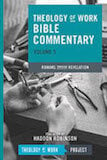Making Sense of Your Life: Paul, Understanding the Man Behind the Message (Philippians 4 Sermon)
Sermon Notes / Produced by The High Calling
Philippians 4:13 (NIV)
“I can do everything through him who gives me strength.”
Central Truth:
Salvation is God’s love story at work in the lives of believers. Along the way, believers develop sweat equity in
the outcome. Paul’s life illustrates the promise of what happens when we let God shape and strengthen our life.
Introduction:
One day my father-in-law was drinking coffee at a McDonald’s in Fayetteville, Arkansas, when he asked
another customer for his name and where he was from. The answer came that Dalhart, Texas, was the place,
and the man gave his name. The following conversation unfolded:
“I bet I can tell you where you lived.”
“You can?”
“Yep. Your place was about 6 or 7 miles north of Dalhart, on the Highway towards Clayton.”
“You are right.”
“I bet I can also tell you a story about your father.”
“You knew him?”
“Yep. On a certain afternoon, your Dad went down into your basement to check on the butane.
When he lit a match, the room caught on fire because there was a leak in the line. And now I can tell
you a story about yourself.”
“What?”
“You were just a boy at the time, maybe 12. When you heard the whoosh, you ran downstairs
into the fire to rescue your father. You got burned along with him but you saved his life.”
The man then wanted to know how this seeming stranger, sitting at a McDonald’s in Arkansas, could know this important story from his life? My father-in-law clarified that Dalhart was also his hometown. Consequently the heroic boy—now a man—felt the renewed strength that comes when the stories of our life are brought together in a way that we can better understand ourselves.
A similar strength happens when we read the Bible. God inspired those events and the telling of those stories in such a way that we come to realize that our life is connected to those stories. For instance, the incredible story of Paul informs, instructs, and inspires us in how to allow our ordinary lives to become extraordinary by the courageous trust of extraordinary faith. Anyone can, but only the willing will.
Learning to Depend on God:
Paul was such an amazing disciple that we can forget he was a person. We can forget that though he was
an Apostle, first and foremost, he was a Christian disciple—like us. Renewed awareness of how, with Paul’s
“flesh and blood” humanity, he became a “new creation in Christ,” we can see how God wants to recreate us.
Paul was not ashamed of what saved him. “The saving” even made it possible for him not to be ashamed of
his need to be saved. In our weakness, false pride (hubris) is lowered and the Spirit is given freedom to roam
with healing power. Through God’s holy kiss, our wounds are transformed into wisdom. And we come to
know ourselves for the first time. (Gal. 1:11-2:21)
Growing in Stages:
The following charts the stages by which Paul grew:
CHILDHOOD—Paul was raised in the cultural city of Tarsus. His father was a Pharisee and Roman citizen.
His mother was Jewish. He had at least one sibling, a sister. His Hebrew name was Saul and his Greco-
Roman name was Paul.
ADOLESCENCE—Still living in Tarsus, Paul was educated in the Torah and Jewish tradition; studied Greek
philosophy and literature.
ENTERING ADULTHOOD—In Tarsus and Jerusalem, Paul lived with his married sister and studied with
the great Jewish teacher Gamaliel. He learned the occupation of tent making (Acts 22:3, 23:6)
THE THIRTIES AND SETTLING DOWN (age 28-35)—Paul decided not to marry and aspired to be an
emerging leader of Judaism (Gal. 1:14). So he debated disciples of Jesus in Greek-speaking synagogues and
participated in Stephen’s martyrdom (Acts 7: 58-8:1). Rationally assured but emotionally confused, Paul
traveled to Damascus in zealous pursuit of his opponents—Jesus’ followers. This was his settling-down
enterprise by which he would fulfill his youthful dreams and ambition.
MIDLIFE CRISIS (age 35-40)—His advancement in the settling down stage wasn’t as fulfilling as he thought
it would be. The conversion experience was being awakened to a part of God he had never experienced—
transforming grace. He became “his own man” by becoming a new person in Christ.
MIDDLE TO LATE ADULTHOOD—Paul became the guiding pastoral theologian of the Christian
movement. He used the theology of Jesus to interpret life for the Greco-Roman world. His theology became
pastoral because he focused all biblical, historical, and systematic theology onto the human heart and mind.
He knew that Jesus provided central answers to the questions of human existence.
When You Don’t Know What To Do Next:
The scene which reveals the sweaty work of trusting is revealed in the pivotal scene of what we refer to as
“The Macedonian Call.” Paul had to learn what we all have to learn—that God would lead him in knowing
what to do and how to do it.
In Acts 16:6-10, we see a time when Paul was stuck. He did not know what to do next. Well, he knew what to do but not where to do it. He was confused, not about his purpose, but about where he was to live out his dream of being God’s Apostle to the Gentiles.
Those with him were good people wanting to get on with their dreams. They thought their lives were hooked-up with Paul’s, but if he was not sure where to go, how could they know their dream’s destination? These good companions sweating it out with Paul were Timothy, Silas, and Luke. They were all faithful people who felt frustrated with having to turn back time and again.
Why? Because, as Luke would later tell the tale, “the Spirit of Jesus would not allow them to.” How the Holy Spirit (which is the same as the Spirit of Jesus) delivered that No to them, we are not told—just that He did. By now, Paul had learned that the nos in our life are as important as the yeses. Nos help us cut out the pattern. They set needed boundaries so the dream can take shape. Having been obedient to the nos, they now wanted to be obedient to a yes.
The pressure was on when Paul went to bed that night in Troas. You know those nights. When you have a problem and all your solutions have failed. Deadlines press upon you. You trust God and are doing what you believe to be his will for you, but you are not feeling the pleasure of his presence. Your life dream is in neutral, slipping into reverse, and you feel like you are doing all you can do to get it into drive.
You pray all the prayer promises…
With God, all things are possible.
And I am with you always.
Wherever two or three are gathered together in my name, there am I in the midst of you.
Ask and you will receive, seek and you will find, knock and the door will be opened to you.
But my God shall supply all your needs according to his riches in glory.
Be careful for nothing but in everything by prayer and supplication let your requests be made known to God, and the peace of God which surpasses all understanding shall keep your hearts and minds through
Christ Jesus.
Paul was leaning into these promises as he slept that night. Pushed to his limits, Paul again gave his dream back
to God for an update. As Paul was growing through the discomfort of not knowing, God confirmed his trust in
Paul by releasing from heaven to earth a dream-revelation now known as the “Macedonian call.” Through this
dream-like vision, Paul saw a “man of Macedonia standing and begging to him, ‘Come over to Macedonia and
help us.’” Relieved, and conditioned by obedience to God, Paul got ready at once to live his dream among a
people and in a place where he had never been. His life dream would prove to thrive in Europe.
Learning From Others:
A further example of discipleship: Acts 18:1-3, 18-20, 24-28—Priscilla and Aquilla. Priscilla and Aquilla
were a married couple who worked alongside Paul in Corinth. Through Christ’s resurrection, they found
delight in marriage; and from their relationship, many people came to know Christian happiness.
I imagine Paul watching them as they arrived in Corinth as refugees from Rome. The Emperor Claudius had
exiled them because of their religious beliefs. They worked alongside Paul as tentmakers. They held Bible
studies in their home. With others, they shared the hope of Christ’s resurrection.
I picture Paul observing their relationship as a remarkable example of love. Maybe it was by observing them that Paul knew I Corinthians 13:4-7 could work in a marriage: “Love is patient, love is kind. It does not envy, it does not boast, it is not proud. It is not rude, it is not self-seeking, it is not easily angered, it keeps no record of wrongs. Love does not delight in evil but rejoices with the truth. It always protects, always trusts, always hopes, always perseveres.” They knew Christ’s love gave them resurrection’s hope to overcome any life-challenge. Know that God wants nothing less for you than to know the power of resurrection which gives you eternal hope.
The End Result:
Paul’s legacy was the early church. By creating churches throughout the Roman Empire, Paul enacted the
mission of Jesus into a structure that would carry the movement for future generations. His pastoral theology
is what nurtured the early church into maturity. Paul believed that living and thinking the Christian message
was essential for common pursuits in discipleship, enabling the church to be the body of Christ.
The gospel of Christ was Paul’s life source. He was not ashamed of what gave him life. Paul grew as an Apostle by growing as a disciple. Paul became strong by successfully trusting in stressful situations. A scene which reveals this sweaty work of successfully trusting is revealed in the pivotal scene of what we refer to as “The Macedonian Call.” We now know what Paul had to trust would become true—that God would lead him in knowing what to do and how to do it.
By tracking down what was going on in Paul’s message, we can best apply God’s word for our lives. Through Paul, we travel through a thirst of the New Testament by highlighting key passages from Acts, Romans, 1 and 2 Corinthians, Galatians, Ephesians, Philippians, Colossians, 1 and 2 Thessalonians, 1 and 2 Timothy, Titus, and Philemon. He became an apostle whose first-century influence shook the Roman world. How God inspired him to do what he did and write what he wrote influences our 21st century world.
*********************************************************************************************************
Leslie Hollon is a pastor, preacher, professor, and author. Leslie serves as Senior Pastor of Trinity Baptist
Church in San Antonio, Texas, a growing regional congregation noted for the impact of its local and global
ministries. Leslie writes in the areas of Christian faith & practice; has contributed to nine books plus several
periodicals. Among his most recent releases was Christian Reconciliation Ministries: Healing Hurts and
Building Hope. A graduate of Baylor University, Leslie holds the Master of Divinity, the Master of Theology,<
and the Doctor of Philosophy from Southern Seminary of Louisville, Kentucky. He was a founder of The
Academy of Young Preachers.
Click here for a PDF of this sermon.
Other sermons in this series on Making Sense of Your Life:

.jpg)
.jpg)







.jpg)
